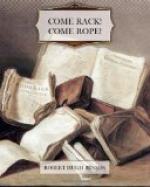III
When supper was finished at last, and the maids had borne away the dishes, there came almost immediately a tap upon the door; and before any could answer, there walked in a man, smiling.
He was of middle-size, dressed in a dark, gentleman’s suit, carrying his feathered hat in his hand, with his sword. He appeared far younger than Marjorie had expected—scarcely more than thirty years old, of a dark and yet clear complexion, large-eyed, with a look of humour; his hair was long and brushed back; and a soft, pointed beard and moustache covered the lower part of his face. He moved briskly and assuredly, as one wholly at his ease.
“I am come to the right room?” he said. “That is as well.”
His voice, too, had a ring of gaiety in it; it was low, quite clear and very sympathetic; and his manners, as Marjorie observed, were those of a cultivated gentleman, without even a trace of the priest. She would not have been astonished if she had been told that the man was of the court, or some great personage of the country. There was no trace of furtive hurry or of alarm about him; he moved deftly and confidently; and when he sat down, after the proper greetings, crossed one leg over the other, so that he could nurse his foot. It seemed more incredible even than she had thought, that this was Father Campion!
“You have pleasant rooms here, and music to cheer you, too,” he said. “I understand that you are often here, Mr. Babington.”
Anthony explained that he found them convenient and very secure.
“Roberts is a prudent landlord,” he said.
Father Campion nodded.
“He knows his own business, which is what few landlords do, in these degenerate days; and he knows nothing at all of his guests’. In that he is even more of an exception.”
His eyes twinkled delightfully at the ladies.
“And so,” he said, “God blesses him in those who use his house.”
They talked for a few minutes in this manner. Father Campion spoke of the high duty that lay on all country ladies to make themselves acquainted with the sights of the town; and spoke of three or four of these. Her Grace, of course, must be seen; that was the greatest sight of all. They must make an opportunity for that; and there would surely be no difficulty, since her Grace liked nothing better than to be looked at. And they must go up the river by water, if the weather allowed, from the Tower to Westminster; not from Westminster to the Tower, since that was the way that traitors came, and no good Catholic could, even in appearance, be a traitor. And, if they pleased, he would himself be their guide for a part of their adventures. He was to lie hid, he told them; and he knew no better way to do that than to flaunt as boldly as possible in the open ways.
“If I lay in my room,” said he, “with a bolt drawn, I would soon have some busy fellow knocking on the door to know what I did there. But if I could but dine with her Grace, or take an hour with Mr. Topcliffe, I should be secure for ever.”




